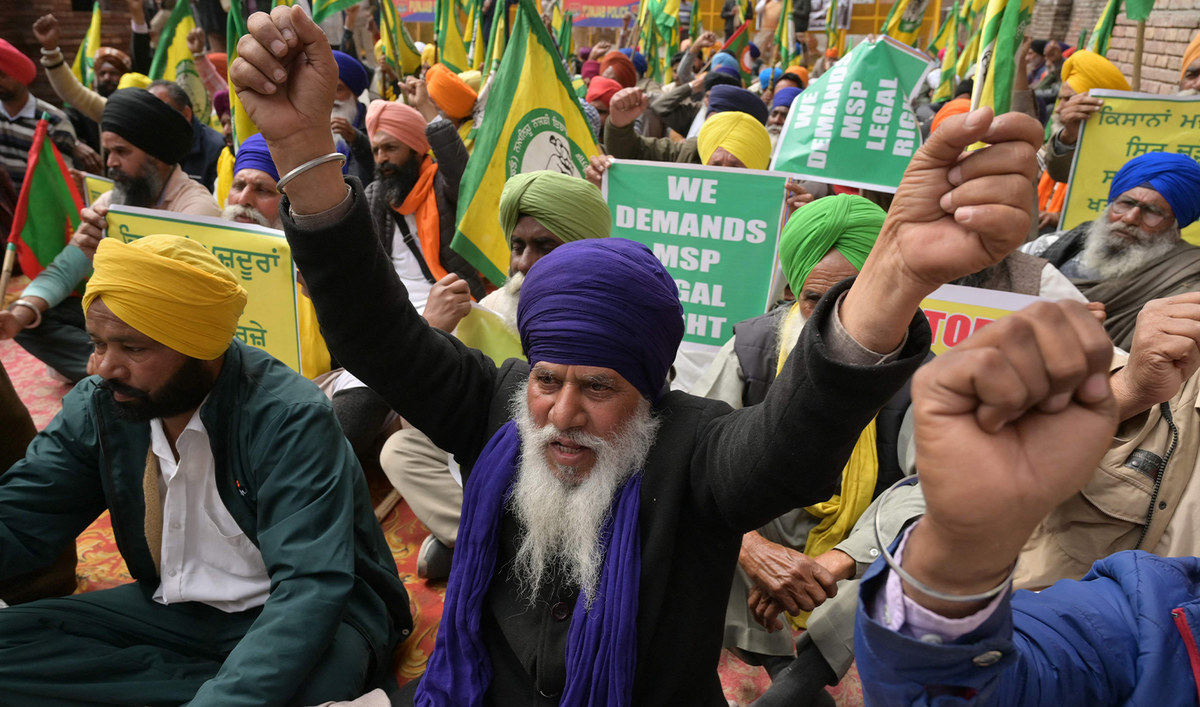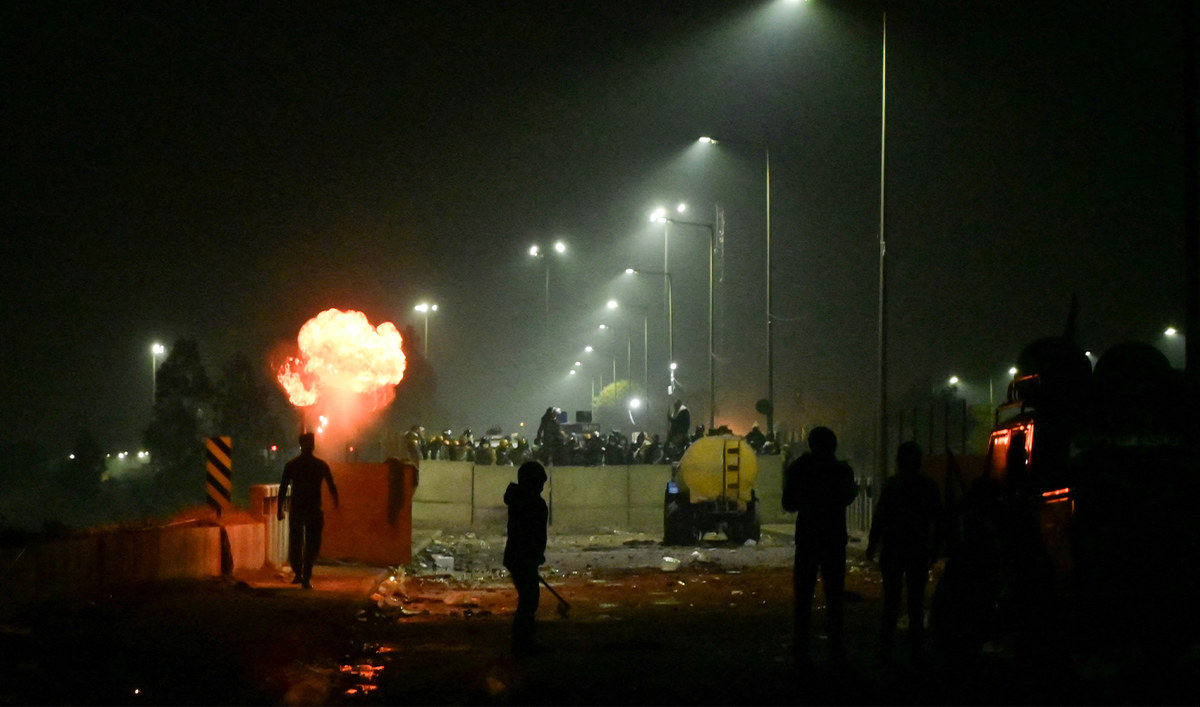SHAMBHU, India: They have been beaten with canes, doused in tear gas and blocked by concrete barricades and metal spikes but the thousands of farmers trying to march to India’s capital to demand higher crop prices also face an invisible barrier — digital blackouts.
As their caravan of tractors and trucks moved from the northern state of Punjab toward New Delhi in February, the farmers found their phones going dead as state authorities imposed temporary Internet shutdowns.
It is not the first time authorities have cut the Internet — India imposed the highest number of Internet shutdowns in the world in 2022 — and campaigners fear more digital crackdowns ahead of elections expected by May.
Farm union leaders are seeking guarantees, backed by law, of more state support or a minimum purchase price for crops.
The farmers, who set off on their “Delhi Chalo” (Let’s go to Dehli) protest in early February, were stopped by security forces about 200 km (125 miles) north of the capital, with water cannons and tear gas used to push them back.
They are now camped out at Shambhu Barrier, on the border between the states of Punjab and Haryana.
Since Feb. 12, Haryana state authorities have cut access to mobile Internet services at regular intervals and for several days at a time. They said they did so to “stop the spread of misinformation and rumors” and to prevent the mobilization of “mobs of agitators and demonstrators,” according to local media.
The farmers, many of whom are members of the Sikh religious minority from Punjab, say the shutdowns made it hard to get medical help for the injured and to source food. It also cut them off from their leaders, making coordination difficult.
“Snapping the communication lines only spreads rumors and distresses our families,” said Hardeep Singh, a 28-year-old who was nursing an injured eye after recent clashes with police.
“We’re already far away from home and the communication blackout adds to our miseries,” he said.

Farmers shout slogans during a protest against India's central government to demand minimum crop prices in Amritsar on March 5, 2024. (AFP)
Neither the chief minister’s office in Haryana nor the state’s telecoms ministry responded to requests for comment.
Campaigners have accused the Hindu nationalist Bharatiya Janata Party government led by Prime Minister Narendra Modi of repeatedly using Internet shutdowns to stifle opposition.
“The alarming trend of Internet shutdowns coupled with widespread online censorship is a grim reflection of digital authoritarianism, particularly in the lead-up to elections,” said Gayatri Malhotra of the digital rights organization Internet Freedom Foundation.
“Should this trajectory persist, it threatens to severely impede people’s access to information, curtail their capacity to make informed electoral decisions, and restrict their freedom to organize, assemble and communicate their electoral demands peacefully,” Malhotra told the Thomson Reuters Foundation.
NO SIGNAL
India frequently uses Internet shutdowns to control protests, including in disputed Kashmir and northeastern Manipur state, where dozens have died in ethnic clashes since last year.

A farmer performs a fire breathing act during a protest demanding minimum crop prices, at Shambhu Haryana-Punjab border near Ambala some 220 Km from New Delhi on February 14, 2024. (AFP)
Mobile access has also often been cut during elections and examinations and these shutdowns were often imposed for indefinite periods and without the publication of shutdown orders, in violation of a 2020 judgment by the nation’s top court.
The state of Haryana ranks fourth in the country for the highest number of Internet shutdowns, following Jammu and Kashmir, Rajasthan, and Manipur, according to Delhi-based advocacy group Software Freedom Law Center.
The farmers’ protests have already sparked other restrictions.
Dozens of accounts on social media platform X have been suspended for backing the farmers, with rights groups and those affected calling the step a worrying sign in the world’s largest democracy where nearly a billion people will cast their votes in national elections due by May.
Although the farmers’ protest is confined to Punjab for now, their complaints of falling incomes resonate more widely, highlighting a perception in India’s huge rural hinterland that Modi has done too little to support the farming community and raise living standards.
Over 40 percent of India’s 1.4 billion people are dependent on agriculture and many say they have suffered economically under Modi. Hardeep Singh, for example, grows wheat and rice on his four-acre farm, but like many he said poor returns on investments, including pesticides and farm equipment, made it increasingly difficult to make ends meet without guaranteed prices for his produce.
While pollsters say Modi will almost certainly win a rare third term in office, the discontent of farmers will be a headache for years to come.
The federal agriculture ministry did not immediately respond to requests for comment about the protesters’ demands for higher guaranteed prices for all crops.
‘STATE OF DARKNESS’

Farmers hold placards and shout slogans during a protest against India's central government to demand minimum crop prices in Amritsar on March 5, 2024. (AFP)
Farmers said the blackout not only stopped them from spreading their message to the outside world, but also blocked them from receiving information and instructions.
“The Internet was our primary means of ensuring our protests receive adequate coverage and reach a wider audience, free from the interference of mainstream media that often portrays us in a negative light,” said Taranjeet Singh, a 34-year-old farmer. In Punjab, Singh is a common surname and middle name.
To overcome the challenge, many farmers have installed television sets in their tractor trailers to get the latest news.
The blackouts also make it harder to treat injured and sick people, and to contact emergency services such as ambulances.
“We are forced to walk several kilometers away from the protest site to access stable wireless network connections, which wastes our valuable time, and could prove fatal for those injured and requiring immediate medical care,” said Baba Sukhdev Singh, a 50-year-old volunteer with the Kisan Mazdoor Sangharsh Committee, one of the unions leading the march.
Many farmers also said signal jammers were being used in the area, preventing them from contacting people in their villages to ask for food supplies.
Taranjeet Singh said farmers were left walking around in desperation, asking one another about what the protest leaders might want them to do next.
“The communication blackout casts us into a state of darkness, exacerbating the chaos and confusion,” he said.





















